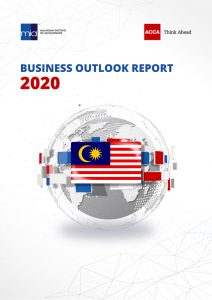More than 80% of respondents forecast higher revenue and profit growth amid increased confidence in government policies and positive GDP outlook for Malaysia in 2020
- 25% of businesses will be looking at spending more than 10% of their budgets on digitally transforming their businesses over the next three years with investments in big data analytics, cloud computing and services and machine learning.
- 70% of respondents have either no plans to reduce headcount or in fact plans to increase headcount over the next three years. Importantly, 60% of respondents have plans to evolve and improve their existing employees’ digital skills and competencies
- Just 41% of respondents have plans to invest in an ASEAN market over the next three years, indicating significant room for more Malaysian businesses to tap into ASEAN’s growth potential
A total of 743 accounting and finance professionals of varying ages, organisations and roles responded to the second MIA-ACCA Business Outlook 2020 survey, including top-level finance professionals and public practice leaders who comprised 43% of the total respondents. This was very nearly double the number of respondents to the first survey (399 respondents), giving greater credibility and weight to the insights reported. The survey was intentionally timed during the last two months of 2019 to cull insights emerging from companies’ annual strategy and budget planning processes, which are typically conducted during this period.
 Report Key Highlights
Report Key Highlights
The following are the key highlights of the report based on the survey findings:
Positive Revenue and Profit Growth Trends. Overall, respondents are highly positive on projected business performance for 2020, and they expect this growth momentum to be sustained over the medium term. 83% of respondents are forecasting increased revenue for 2020, of whom 48% expect growth of 5% or more. In terms of profit outlook for 2020, 86% of respondents expect it to be positive with about half of them anticipating profit growth of 5% or more. This bodes well for corporate earnings going forward, fosters an attractive climate for investment and stimulates more employment opportunities in Malaysia, while enabling investment in digital transformation, product and market innovation and productivity gains.
Driven by Domestic Factors. The survey indicated that domestic drivers – both positive and negative – have the most impact on Malaysian businesses. Malaysia’s economic growth and confidence in government policies to stimulate growth were seen as the top positive drivers, while rising cost of living and low wage growth, and uncertainties caused by government policies were seen as the top negative drivers going forward.
ASEAN – A Potential not to be Missed. Only 41% of respondents have plans to invest in an ASEAN market over the next three years. This increases slightly to 52% if only respondents from public listed companies (PLCs) are taken into consideration. “We believe this leaves significant room for more Malaysian businesses, including SMEs, to consider tapping on the ASEAN growth potential. Accounting and finance professionals clearly have a vital role to play in strategically supporting their businesses as they evaluate and navigate these opportunities,” commented ACCA Malaysia Country Head Edward Ling.
Addressing Regulatory Changes and Compliance. Regulatory changes and compliance concerns were repeatedly called out as the leading challenge for organisations, signalling a need for policy-makers to address the design, communication and implementation of policies going forward.
Leading Digital Transformation, Future-proofing Talent. The survey findings provide invaluable insights on the level of digital and technology investment in Malaysia, even as the government pushes harder for enterprise and corporate digital transformation. A quarter of respondents reported that their organisations are allocating more than 10% of their budget on technology spending and digital transformation over the next three years, including investing in big data analytics (64%), cloud computing (57%), machine learning and artificial intelligence (33%), and robotic process automation (27%). “This represents a significant catalyst for driving the digital and technology transformation of Malaysian businesses,” said MIA Chief Executive Officer Dr. Nurmazilah Dato’ Mahzan.
Interestingly, despite these technology adoption plans, 70% of respondents have either no plans to reduce headcount or in fact plan to increase headcount over the next three years. Importantly, 60% of respondents have plans to evolve and improve existing employees’ digital skills and competencies. “This clearly demonstrates tremendous opportunities for professional accountants to raise their game and increase their relevance to the organisations and clients they serve,” added Dr. Nurmazilah.
About the Report
The Business Outlook Report 2020 is jointly commissioned by the MIA (Malaysian Institute of Accountants) and ACCA (Association of Chartered Certified Accountants) to provide insights into the collective viewpoints of accounting and finance professionals, with regards to the business outlook for Malaysia in 2020 and in the medium term. Second in a series, this study is part of a collaborative research initiative undertaken by both professional bodies to synergise resources and share critical findings on pertinent topics in today’s business landscape. MIA and ACCA trust that this report will be a useful resource that supports policy-makers and business leaders in developing forward-looking strategies to drive sustainable growth for nation-building.
Click here to download the MIA-ACCA Business Outlook Report 2020 https://www.mia.org.my/v2/downloads/resources/publications/2020/02/03/MIA-ACCA_Business_Outlook_Report_2020.pdf







